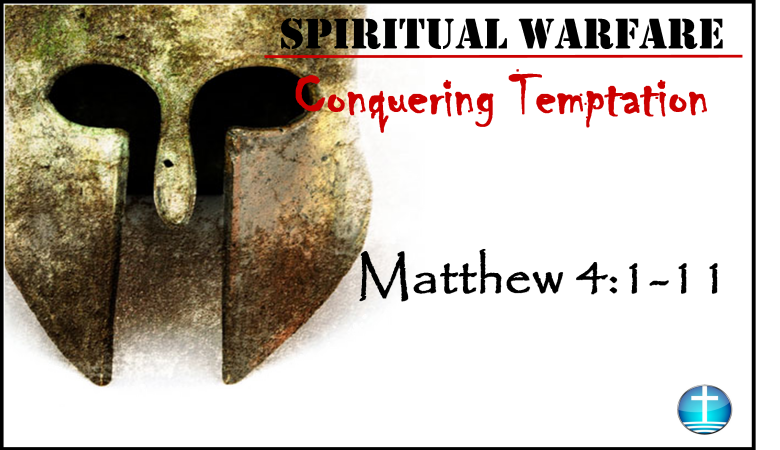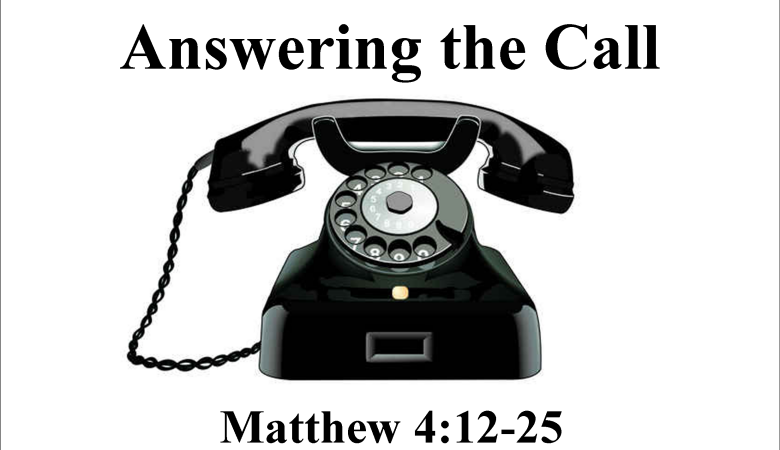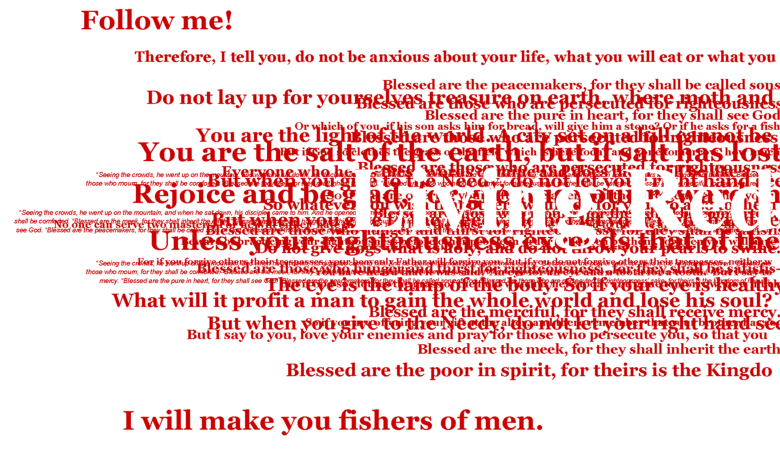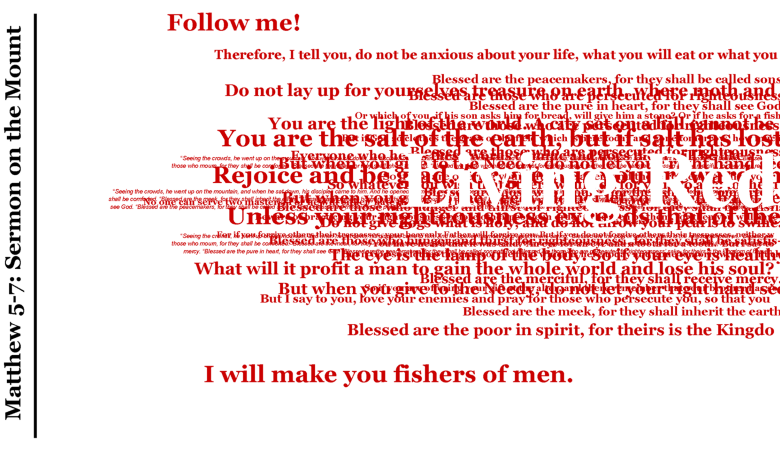Matthew 26:57-68 ~ "The Examination of the Claims fo Christ"
There’s an age old idiom I’m sure we’ve all heard at some point; “Don’t throw the baby out with the bathwater”. Now I dug deep to find the origin of this saying, and after all my research, the esteemed scholars of Wikipedia informed me that it originated from an old German proverb in the 1500’s. Some claim the saying comes from a time in which an entire family would bathe in the same tub of water. The father would go first, followed by the mother, going down through the children. The water was rumored to be so dirty, that by the time the baby was bathed, the water was black and you could lose the baby in there. Other people claim that that has no historical data to back that up. Either way, it doesn’t really matter because the saying has become so famous that it carries its own meaning, which is this, in our efforts to get rid of the bad, don’t miss or sacrifice the good.
One of the shows that Kyla and I watch together is about lawyers. On this show, and others I’ve seen, a typical plot line is when some kind of monkey wrench is sprung on the attorneys. And of course, it seems like a death blow. The only way the attorneys are able to execute justice is if they are able to some how pull off an impossible task in an even more impossible time frame. It’s the morning of the trial. The lead attorney is there, but the co-council is not. He’s running late. The tension is building. The attorney knows his case is dead in the water. The opposing attorney swaggers in with confident taunts. Then, just at the last moment, the co-council rushes in and takes his seat. The frustrated lead attorney asks where he was. The quiet but calm co-council slides a file over to the lead attorney. He trust his co-council, so he stands up in the court room, does his thing. He uses the evidence, and just like that, it's over. He's won, or at least he’s got a major win for how the case proceeds and has ensured victory for a later point.
After the courtroom clears, the attorney pulls the co-council aside. He’s amazed, so he just has to know how his partner pulled off this miracle. So the attorney asks the co-council where he got the evidence. The co-council doesn’t say anything, he just looks back at the attorney. He repeats the question, “Where did you get this?”
“What matters is that it's true.” Says the co-council. At that moment, the attorney’s eyes go wide. He knows he’s been hooped. He knows that his partner has retrieved this evidence illegally. In their attempt to uphold justice, they violated the law and perverted justice.
This morning we are continuing to walk through Matthew’s account of the Gospel of Jesus Christ. We’ve looked at the account of the Last Supper, the battle of prayer and submission in the garden of Gethsemane, and then Jesus’ arrest. That all happened on a Thursday night. In our passage of Scripture this morning, we will study Jesus’ trial before the Sanhedrin in the early morning hours of Friday.
In any Jewish village which consisted of 120 adult males or more, a Sanhedrin was established. A Sanhedrin consisted of 23 men. These men constituted the judicial body in Jewish civilization. Jerusalem’s Sanhedrin, being in the capital city, was known as the Great Sanhedrin. It comprised 71 men, 24 elders, 24 chief priests, and 23 scribes including the high priest. The odd number of members dictated that there would always be a majority vote. The Great Sanhedrin functioned like our Supreme Courts. The men chosen for this position would have already served in another Sanhedrin and proven themselves very gifted and capable.
This judicial body was established on the commands given to God’s people in Deuteronomy 16:18-20 “You shall appoint judges and officers in all your towns that the LORD your God is giving you, according to your tribes, and they shall judge the people with righteous judgment. You shall not pervert justice. You shall not show partiality, and you shall not accept a bribe, for a bribe blinds the eyes of the wise and subverts the cause of the righteous. Justice, and only justice, you shall follow, that you may live and inherit the land that the LORD your God is giving you.” All throughout the Old Testament, we see the truth of God revealed to us. The Law was given to keep the people Holy before the Holy God. All throughout history, it was more often than not that only a faithful few were seeking God. The law was ignored. But what about after the exile? What about now in the New Testament era? Did they receive their wake up call? Did things change? And we’re not even talking about the whole people. What about the few men who dedicated their lives to upholding the holy justice of God? What will we see within this body of the Great Sanhedrin. Will we see faithful, holy, and righteous men? I think we already know the answer to that, but we must be faithful here ourselves, so let’s look in depth at the proceedings of this trial compared to the holy standard of operation they was given by God.
Matthew records the Passover dinner, the prayer in Gethsemane, the arrest, and then we read that Peter follows at a distance. Jesus has a trial before Caiaphas and the Sanhedrin, and then we read about Peter’s denial of Jesus. Each one of the four gospels draw out some different details to give us a different and fuller perspective of all the moving parts that were at play. The 18th chapter of John’s gospel is particularly helpful in painting that fuller picture. From John, we learn that Jesus first went to the house of Annas after he was taken from the garden. While there, Peter denied Jesus the first time. Then Jesus goes to Caiaphas’ house and stands trial before the whole council. It is there, the Peter denies Jesus for the 2nd and 3rd times.
Annas had been the high priest for about 5 or 6 years. He had been removed from his office by the Roman government about 20 years prior to this present trial with Jesus. Now in Jewish tradition, the high priest retained his position for life. So Annas is still regarded by many as the true and legitimate high priest. His son-in-law, Caiaphas is the official high priest, installed and recognized by the Roman government. I wanted you all to understand the process, but for our purpose and duty of fully understanding the full meaning of what Matthew is communicating here, we will simply focus on Caiaphas’ questioning of Jesus, and not Annas’ which is recorded in John.
As we look at the proceedings of these trials, we see a number of discrepancies. The discrepancies aren’t in the Word, or the written account, but rather its in the numerous ways the court is violating the law. First of all, a bribe was paid to Judas for the betrayal and arrest of Jesus. Why was this even necessary? Jesus wasn’t a violent rebel who made attacks and went into hiding. He was a public figure. Jesus said himself in verse 55 “Have you come out as against a robber, with swords and clubs to capture me? Day after day I sat in the temple teaching, and you did not not seize me.”
Secondly, they did not arrest him and try him in the morning. The arrested him and began the trial immediately in the middle of the night. That was illegal. All trials were to be held during the day. In fact, they could not even start a trial in the late afternoon, because this would cause a temptation to have a speedy and unjust trial for the desire of getting tired and going home or perhaps exclude others. Along those same lines, a trial could not be held on the day of a feast or even the day before. This rule was broken as well.
Furthermore, a trial had to be held at the Hall of Judgment which was in the temple complex. Two trials in the middle of the night at the houses of two individuals was highly illegal. They were not public trials. Also, if a guilty verdict was reached, the punishment could not be decided upon until the next day. This provided for clarity of thought and to protect the defendant from harsh and emotion driven punishments. We see in verses 65 and 66 that the verdict and punishment were decided within moments of each other in the height of emotion and theatrics as Caiaphas screamed at our Lord and tore his own robes and called for a decision.
On top of that, look at verse 59 and 60. “Now the chief priests and the whole Council were seeking false testimony against Jesus that they might put him to death, but they found none, though many false witnesses came forward” There is a whole lot going on in these two verses that need to be explained. We’ll get to it, but for right now simply note that they were seeking testimony. I’m not even going into the false thing. They arrested him and brought him to trial. They shouldn’t be seeking any testimony. They were seeking testimony because even though Jesus had been arrested, and even though they were already in the the middle of an illegal trial, and even though Jesus has been struck unjustly by the servant of Annas, they still did not have any evidence of a single crime that he had committed! Why is a man on trial when you don’t even have a charge?!
When they finally did bring a charge, Jesus was not allowed any witnesses. He was allowed no defense. He was convicted by his own testimony which was also, as you guessed, illegal.
Additionally, both Annas and Caiaphas violated their roles. Annas questioned Jesus not about a crime, but in order to find a crime and a fault. Jesus was on trial in innocence while they could find a charge. And when Caiaphas questioned Jesus he strayed from asking about the charge at hand asked directly, “I adjure you by the living God, tell us if your are the Christ, the Son of God”. He brought his own charge in a search for specific words. He declared Jesus guilty without any discussion of whether or not Jesus’ claim was true. That’s no trial. It's a head hunt.
Now let's not forget about Peter; the loud, proud, naïve Peter. Peter was often the spokesman of the twelve. As much as we love to criticize Peter, he is the one that most accurately displays the foolish heart that dwells in each of us and that we so desperately try to cover up. In the midst of Jesus’ trials and journeys from the garden to Annas and to Caiaphas, Matthew gives us one sentence in verse 58 about Peter. He followed at a distance to see the end. The man who just a few hours before had vowed “Though they will all fall away because of you, I will never fall away”; this man is keeping a low profile in the courtyards to hear the outcome. What’s important to note is that at this point of time when Jesus is before Caiaphas and the council, John’s account informs us that Peter has already denied Christ once. Also, Peter is in the process of denying Christ 2 more times in Caiaphas’ courtyard.
And what’s Jesus’ response? False charge after false charge, Jesus remained silent. He did so because there was no need to say anything. He had made his plea to God the Father in the garden. He had no need to escape the cross because God the Son was trusting the Father’s command and resolve to intentionally go to the cross. When we look at the account of the trial and crucifixion, it’s easy to be disgusted. In fact, when we really look deep, it’s hard not to be upset. We see the injustices and quickly lose heart at the evil going on in our own lives. Wickedness takes no rest. Under the cover of dark, working hard where no one sees, wickedness is doing damage.
But don’t forget who’s in control in this situation. For the entirety of Jesus’ incarnation, Satan was working to prevent the cross. Now, Satan has changed his attack. He wants suffering. He wants death. But what if in the final moments before the cross, he could tempt Jesus to succumb to sin. He throws the strongest taunts he can, giving Jesus every opportunity to say something, to either avoid the cross or lash back in pride and anger and go to the cross as a sinner. But the injustice of the trial shows the purity of our lamb. Satan is not in control here. The council is under his control, but Satan’s best shot is still nothing for God. God is transcendent. He is independent of his creation, even of His angels, even of Satan who rejected Him. He puts his sovereignty on full display even in what we see as the epitome of human misery.
Verse 63-64 “And the high priest said to him, ‘I adjure you by the living God, tell us if you are the Christ, the Son of God.’ Jesus said to him, ‘You have said so. But I tell you, from now on you will see the Son of Man seated at the right hand of Power and coming on the clouds of heaven.’” In Mark’s account, Jesus is recorded as saying “I am”. Matthew’s account, though slightly different wording, does not conflict with that. This statement is certainly a claim of deity. The imagery refers to a prophesy of the Messiah made by the prophet Daniel. But there is something amazing about Jesus words. Caiaphas was clearly hunting for a word. He did not seek the truth, he wanted an excuse to do what he wanted. Jesus point that out. “YOU have said so.” These are your words. You are looking for a nut job. You are looking for a rebel. You are looking for a blasphemer. You are looking for a reason to kill me. Here it is. Here’s your word, here’s your excuse “But I tell you”… Here’s the shift, and with these next words Jesus gives a message that hits Caiaphas right in the gut and angers him to his core. “But I tell you, from now on you will see the Son of Man seated at the right hand of Power and coming on the clouds of heaven.” Seated at the right hand of Power. Power is used here as a name for God. Jesus takes the petty and narrow minded intentions of Caiaphas and holds them up against the glory of the Lord God Almighty. I am no rebel. I am no blasphemer. I am God and in your sin you are declaring that I am not the God of salvation to you, but I tell you then that I will be the God of judgement to you. And it wasn’t blasphemy because he could back it up. He had already. He did what only God could do. He spoke truth. They didn’t like it, but it was no less true. When you’re dealing with a false prophet, you want him to talk. You want his words and deeds to come to light, because the light of the truth exposes them for the lies that the are. But with Jesus, it’s just the opposite. They’re doing their deeds in the dark to quiet him. They’ve been cut to the heart and they don’t want to hear any more.
Jesus’s words draw a line in the sand. He compares small minded wickedness with big picture righteousness. As he already said in chapter 12, Whoever is not with me is against me, and whoever does not gather with me scatters.” Jesus lays bare the desire of these men's hearts with his words in the garden, with his silence before false witnesses, and by not shying away from the truth. The council had already decided the verdict of the trial even before there was a charge. They would have preferred true testimony, but they were happy to settle even for false ones because they would do whatever they had to to get the job done. The many false witnesses were rejected not because they were false but because the council wanted more that any mere conviction. They wanted death. That’s why they paid a bribe and did this all in the dead of night on the Passover. It was the least unlikely time to do it because it violated so many laws that no one would expect it. They had this thing signed, sealed, and delivered to Pilate at 6:00 am. They did this so they could avoid the crowds. They didn't want justice. They wanted death. If there was anywhere to look in the world for righteousness and faithfulness, it should’ve been the Sanhedrin. If there was anyone who came close to salvation by works, it should have been these men. But compare them to their standard set forth in Deuteronomy. They paid bribes and subverted the cause of the righteous. They showed partiality because they only sought death for the one person who did not deserve it. They perverted justice by doing the work of the devil. They had no regard for justice, truth, righteousness, or anything of God. They proved the need for a Savior. Jesus comes out of this trial not in defeat, but in affirming hope. He affirms His need to go to the cross and His worthiness to conquer the grave.
In this mockery of a trial, the line in the sand is drawn not only for the Council, but for us. Here’s what I mean by that. Don’t throw the baby out with the bath water. Are we focused on the petty and the small, or the incomprehensible and infinite glory of God? Well of course I’m focused on God’s glory, Pastor. Whew, I’ve answered that one. I’m safe. But what are the things that we are most passionate about? What are the things that set us off? The Sanhedrin prided themselves in their service of God, but with the clear 20/20 vision of hindsight, we know they weren’t. They missed God incarnate right before their eyes and they used their devotion to God as their excuse. But if it was true Godly love and devotion, they would have seen Jesus for who he really was. The Christ.
We often ignore injustices all around us. We accept bribes. Only, we don’t call them that. Satan is trickier than that. What it often looks like is venting too a friend about our struggles. And we intentionally choose someone we know will always take our side so we can invoke their sympathy and justify the wrong thing we did or the right thing we didn’t do. We disconnect from the far reaching truth of Scripture and focus on the subjective circumstances right in front of us. And at the same time we become passionately enflamed about certain things. And if we look too closely, we become religiously focused on a few trigger words. And in so doing we become Caiaphas. We behead anyone who disagrees with us. What would be better would be to see the full revelation of God, to seek understanding of His purpose and His plans, and be a part of it.
You see, we tend to think well of ourselves when we wade out into the thick of things. We’re not afraid to get dirty. But we go too far. We get in over our heads. We wage “righteous” wars and get down to the knitty gritty details. We become so focused on this one issue, this one freedom or right that we think we’re being denied of, the area where we think we’re being wronged, that we commit sins to see the righteous results we think we’re after. But we’ve lost ourselves by that point. Jesus is ever calling us to step back. If we want to wage war in the knitty gritty, He gives us the same answer as Caiaphas, “You said it.” You can have your war. But I’m calling you to step back and look at the glory and planed of God in its fullness. Jesus is ever calling us to submit to Him in entirety.
We're not forgetting Peter here either. Verse 75 tells us that Peter didn’t remember Jesus prophesy of Peter’s denial until the rooster crowed. Until that moment, Peter didn’t even realize what was happening in the midst of his 3 denials. Until that moment of realization, Peter was still entrenched in his naïve pride. It’s easy for us to lie low. Like Peter, we want to see the outcome, but we don’t want to be part of it. We may not verbally deny Christ or deny being a Christian, but what does our life actually proclaim. If we lead a simple and quiet life and ignore every opportunity to serve others, disciple others, care for the hurting, and care for Christ’s body, then what we’re really proclaiming is that my preferences and my comfort and my schedule and my convenience are what matter most. That’s a denial of the life we’re called to live. We get mad at the church and say no one has come to talk to me for so long. No one is including me in these areas of service. That is often true, churches are made up of sinners who do wrong and imperfect people who make a lot of mistakes. But we must not be like Peter and wait until the end. We must be aware of our sin. Ask ourselves the question. Have I reached out to anyone in the body? Have I sought fellowship? Have I sought out the hurting? Have I sacrificed to serve? Have I sacrificed to share the gospel or aid others in doing so? Have I truly sought the truth of God and His word with all of my heart, soul, mind, and strength.
Ephesians 3:9-10 reads “and to bring to light for everyone what is the plan of the mystery hidden for ages in God who created all things, so that through the church the manifold wisdom of God might now be made known to the rulers and authorities in the heavenly places.” The mystery of God is that he would humble himself and endure so greatly to save us. The wisdom of God is when we repent of the death of our sins and live as new creations in the freedom and power of grace through faith. God makes this wisdom known through his church. I challenge us all in this way. If you want to avoid being Caiaphas or the Peter that sat back and denied his Lord, then don’t miss what Christ says. Don’t miss the Son of Man seated at the right hand of Power. Don’t live a good life. Live a life that is completely revolving around and reflecting on and seeking a deeper understanding and more faithful living out of the Gospel. Stop just coming to church. Be a part of the church. Take part in its struggles. Take part in its strengths. Take part in Christ.
Are our hearts for Christ, or are they for ourselves? That is basic question Christ asks. That is the question we all need to answer. We are for Him or against Him. We will all see Him seated at the right hand of Power and coming on the clouds. Will that cause joy in our hearts or will we tremble with fear and dread in our soul?
Series Information
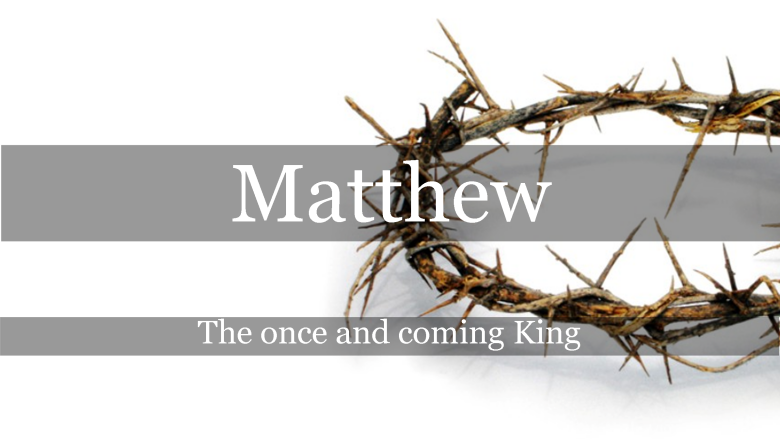
The Gospel of Matthew is a story about a once and coming King. Jesus of Nazareth is the Son of David, the long awaited for Messiah. He has come once, and Matthew tells the story of His arrival, ministry, sacrificial atoning work on the cross, and His promise to return soon.


